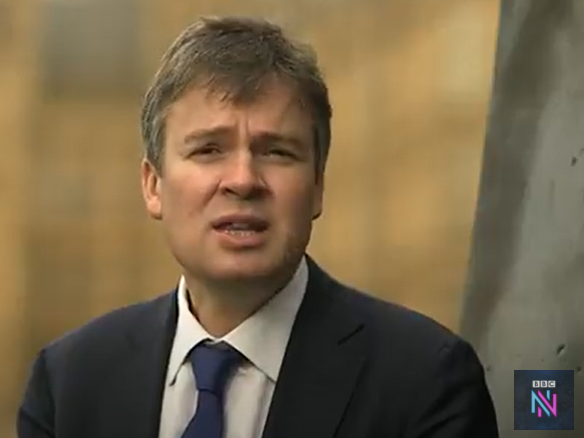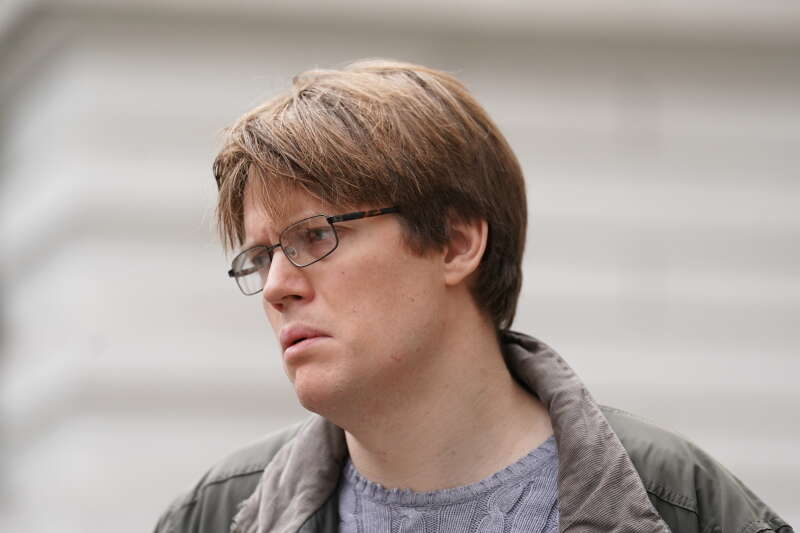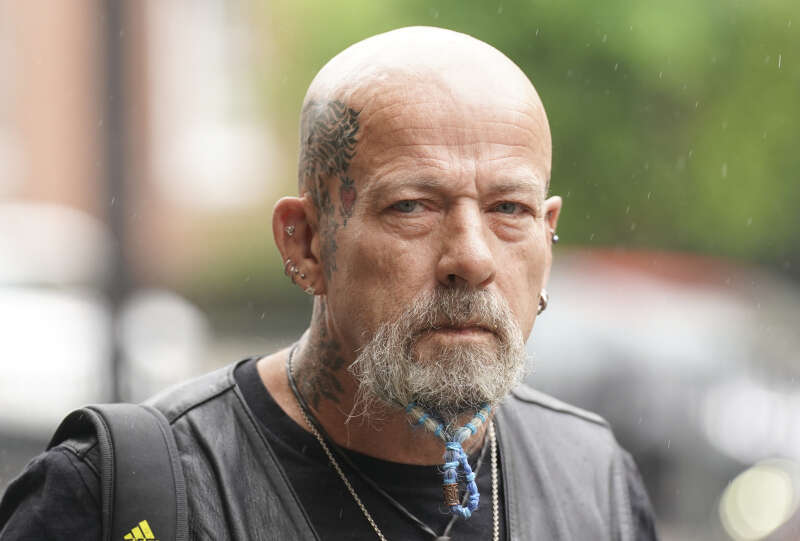
A man accused of being part of a crowd that intimidated a Newsnight journalist during an anti-lockdown protest in Whitehall apologised to the BBC man’s family before blaming him, a court heard.
Christopher Aitken said he was “sorry” for “any distress that Nick Watt’s family feel” over the incident in June 2021 while giving evidence to Westminster Magistrates’ Court on Thursday.
But moments later, the 62-year-old suggested Watt (pictured) was partly responsible and may have attended the protest to agitate the demonstrators.
Footage played in court showed protesters shouting in the face of the BBC Newsnight political editor, who was wearing a BBC lanyard at the time.
He first walked away from the crowd, but then took off running back through those behind him, eventually making his way behind the gates of Downing Street.
In the video, some can be heard shouting “traitor”, while another asked “how can you sleep at night?”
The court heard the experience had left Watt “very shaken” and the footage had upset his family.
Aitken could be seen on the video beating a metal tin with a spoon next to Watt as he ran through the crowd to escape.
While Aitken denies a charge of using threatening, abusive or insulting words or behaviour with intent to cause harassment, alarm or distress, he apologised to Watt.
He said: “I didn’t intend to cause any unhappiness to Nick Watt’s family and if there’s any distress that Nick Watt’s family feel over this. I am sorry and I apologise for that, it wasn’t my intention.”
However, he proceeded to apportion blame to Watt, saying: “He is responsible for some of what happened.”
Aitken suggested Watt may have attended the protest with the intention of agitating, and while he first agreed with prosecutor Alex Matthews the theory was “baseless” he later said it was not “without its merits”.
He told the court: “I’m unsure if the whole thing was manipulated by him to rile the crowds.”
He said he wanted to make Watt aware of his unhappiness with the BBC and believed the broadcaster had “betrayed the public” through its coverage of the pandemic by not representing viewpoints contradicting the Government.
The court also heard from co-defendant Martin Hockridge, 58, who accepted shouting “traitor” at Watt several times, but denied trying to make him feel threatened.
Giving evidence, he said: “I didn’t want him to feel threatened. I didn’t want him to feel intimidated. That’s not what I’m about”
He later added: “My intention was not to harass, my intention was to express my feeling.”
The court also heard how, during a police interview, Hockridge told officers Watt “should face a Nuremberg-style trial for his role”.
Hockridge, Djazia Chaib-Eddour, 44, Alexander Peat, 34, and Gary Purnell, 45, all deny charges of of using threatening, abusive or insulting words or behaviour with intent to cause harassment, alarm or distress.
Peat accepted being present at the demonstration and saying “traitor” as Watt passed him but denies the charge, the court heard.
In a police interview after his arrest, read to the court, he told officers: “I didn’t say anything, I just called him a traitor, that’s all I said. Other people may have sworn at him, I didn’t call him any four-letter words.”
Chaib-Eddour said her involvement was limited to asking him a question, although footage showed her and Hockridge walk behind and alongside Watt for several metres, the court was told.
In her police interview, which was also read to the court, she said: “As you can see he walked straight up to me, I saw the BBC lanyard around his neck and I said ‘you need to start reporting on honest journalism’.”
Chaib-Eddour, who had a “defund the BBC” stickers on her umbrella at the protest, told the court on Friday she wanted to talk to Watt about reporting “honest journalism” and she was “sad” and “disappointed” he did not want to talk to her.
She said: “It is actually really sad. Most people engage with me. I am a friendly person.”
Purnell gave a no comment interview to police and chose not to give evidence in court.
Watt told the court on Wednesday he had left his office in the parliamentary estate to observe the protest, which was initially “reasonably good natured” before the “atmosphere deteriorated”.
He said he ran “like an express train” to safety near No 10 after realising there was a “huge physical threat”.
“I had become their prey, their quarry. It was like hunting a vulnerable animal,” he added.
Aitken, of Lambeth, Hockridge, of Harpenden, Herts, Chaib-Eddour, of Islington, Peat, of Wandsworth, and Purnell, of Shepherd’s Bush, were released on bail.
The trial continues.
Picture: BBC Newsnight/Youtube screenshot
Email pged@pressgazette.co.uk to point out mistakes, provide story tips or send in a letter for publication on our "Letters Page" blog


